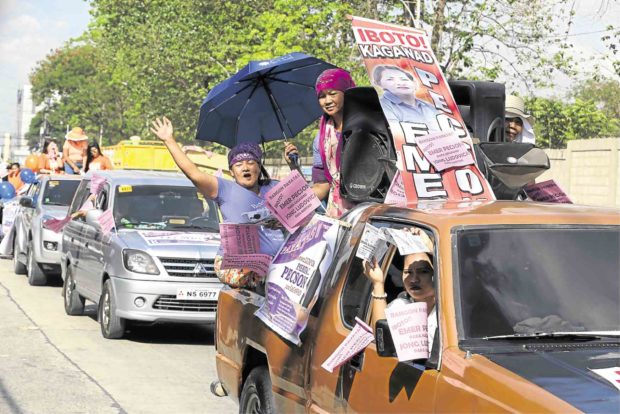
AND THEY’RE OFF! Kicking off the campaign period for the May 14 polls, a motorcade of barangay and Sangguniang Kabataan election candidates makes its way through Barangay Payatas, Quezon City, on Friday. —NIÑO JESUS ORBETA
If there is anything that can be said about the newest member of the Commission on Elections (Comelec) it is that she is candid.
Socorro Inting, who had served as Court of Appeals judge for nine years prior to her appointment to the poll body, admitted that election laws were “alien” to her, but she quickly assured her new colleagues that she learns fast.
Inting said she was “a little bit apprehensive” about her new job and that she left the appeals court with a “heavy heart.”
“To be honest, election law is alien to me, so I really need to study the election laws and other related matters. And so I beg of you, commissioners, to bear with me. But don’t worry, I’m a fast learner,” Inting told Comelec officials and employees after she took her oath on Thursday as one of the members of the poll body before acting Comelec Chair Al Parreño.
“I am a team player, I can think outside of the box,” she added.
Despite her apprehensions, she said she was excited to start a new career and take on new challenges in the Comelec.
Sad yesterday, happy today
“If I was sad yesterday, today I am happy, and I rejoice because I am beginning a new life in the Comelec, a new and challenging career,” Inting said.
“I’m excited because this is my first day with the Comelec. I count my appointment in the Comelec as God’s blessing because not everyone is lucky to be appointed to the Comelec,” she added.
Inting thanked her new colleagues for the warm welcome and assured all that “I will always adhere to my lifelong credo and that is to always do what is right.”
She replaced former Comelec Commissioner Arthur Lim who retired in February. She would serve until Feb. 2, 2025.
In welcoming Inting, Parreño said she would give timely help to the Comelec, which is now in the thick of preparations for the barangay and Sangguniang Kabataan polls and the 2019 national and local elections.
Inting came in on the eve of the start of the May 4-12 campaign period for the village polls.
‘Report violations’
In a press briefing on Friday as campaigning got underway, Comelec spokesperson James Jimenez called on the public to report violations by any candidate, particularly illegally placed campaign posters, which should measure only 24 inches by 36 inches (2 feet by 3 feet).
He said the Comelec would dismantle illegal campaign materials and would not accept any excuse from candidates, including those who claim that posters that violated the rules were put up by their opponents.
“Usually we tell them, ‘If you did not put it up, then tear it down. If you do not take it down, then obviously you benefit from it and it will be clearer who would be liable,’” Jimenez said.
He also urged voters to “stop being neutral” and reject candidates with “bad behavior.”
“Why would you approve of that behavior in someone who presumes to be your leader?” Jimenez said.
He said he hoped that candidates who would take advantage of loopholes, and are undisciplined and unprincipled in conducting their campaign would lose in the elections.
“Hopefully those who would win are those who know how to respect the law,” Jimenez said.
Given that the use of social media in the country is unregulated and the distribution of campaign materials on the internet is largely free, Jimenez said the Comelec would instead be monitoring the content of online propaganda with “high-production value,” such as videos that are well-produced or with celebrity endorsers.
Only P5 per voter
Candidates are only allowed to spend P5 for each voter in the barangay that they are running in. Overspenders will be disqualified, he said.
Regarding concerns over compensation by teachers who serve on Election Day, Jimenez said it was up to the Bureau of Internal Revenue on whether to deduct a tax on their pay, which amounts to at least P3,000.
Education Secretary Leonor Briones has appealed for a higher, tax-free honorarium and travel allowance for the teachers.
“DepEd (Department of Education) teachers and personnel have long been at the forefront of every electoral exercise in the country; with their immense experience in carrying out this enormous task in clustered precincts of huge populations, we deem that evaluation and discussion on the possible increase in honoraria and allowance are just and necessary,” Briones said in a statement on Thursday.
She pointed out that prior to the implementation of Republic Act No. 10756, or the Election Service Reform Act (Esra), poll honoraria were not subjected to income tax.
Now that the law has improved the compensation package of volunteer-teachers, she said “it is only fitting that they truly benefit from their hard-earned compensation.”
Esra currently provides higher honoraria, additional travel allowance, service credits, legal indemnification package, medical assistance, and death benefit for teachers and personnel who will volunteer during elections. —WITH REPORTS FROM JULIUS N. LEONEN, JOVIC YEE AND PATHRICIA ANN V. ROXAS